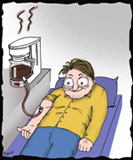As we have seen, caffeine is found in a wide variety of sources. Does the form in which caffeine is ingested influence its ergogenic, or energy boosting, effects? In other words, do the energy boosting effects of caffeine vary, depending on whether the caffeine is delivered in a cup of coffee, a caffeine “alertness aid,” a headache remedy, a caffeinated soft drink, or even a suppository or an intramuscular or intravenous injection? Are tablets of synthesized caffeine somehow different from the same amount of caffeine in tablets made from extracts of coffee, tea, guarana, cola, or other botanicals?

“It couldn’t possibly matter,” you might answer. “Caffeine is caffeine.” However, to the astonishment of many, a ground-breaking study found that there are major differences in the ergogenic effects produced by caffeine in the matrix of coffee and caffeine found in other sources (Graham, T.E., et al, “The metabolic and exercise endurance effects of coffee and caffeine ingestion,” Journal of Applied Physiology, 1998; 85:883-889). In this study, high performance runners ran to exhaustion at a pace approximating their best time on a 10 kilometer (6 mile) run. Caffeine, about 4.5 mg/kg (or about 300 mg for a 150 lb man, about as much as is found in 2 cups of filtered coffee) mixed with water, when taken an hour before the run, produced a remarkable improvement in endurance of nearly 33%, an increase in running time from 32 minutes to 41 minutes. But, astonishingly, the same amount of caffeine delivered in coffee (or in decaffeinated coffee mixed with powdered caffeine) produced no improvement at all!
How could this be? The differences in outcome could not be explained by differences in caffeine absorption, because blood tests proved that the time of peak plasma caffeine concentration (highest blood levels) and the overall actual caffeine concentrations achieved were identical in both groups. The differences could not be explained by differences in caffeine metabolism, because the pattern of its metabolites was also identical in both groups. In fact, so far, no precise explanation for these differences has come to light. Nevertheless, the absence of an ergogenic response to regular coffee is proof that coffee simply does not have the same pharmacodynamic actions as caffeine alone. The conclusion must be that, in some mysterious way, one or more of the hundreds of active components of coffee counteracts some of the primary benefits of caffeine for athletic performance. Perhaps coffee actually has ergolytic (as opposed to ergogenic) effects—that is, that there is something in coffee that is detrimental to energy output.
Peter R. Martin, M.D., professor of psychiatry and pharmacology, Vanderbilt University, has shown that the stimulating effects of caffeine are offset by other chemicals in coffee called “chlorogenic acids.” Chlorogenic acids, which are dietary phenols, kinds of aromatic organic compounds, aren’t all bad. In fact, like caffeine, they are antioxidants. And Martin is also studying possible therapeutic uses of a synthetic form of the chemicals. However, if Martin is right, they may be the culprits that work to limit the power of caffeine when it is found in coffee. Tea also contains chlorogenic acids, so it may interfere with caffeine as well.
Has it been conclusively established that coffee has no ergogenic benefits? Not really. Coffee may help improve your athletic performance, but caffeine in the absence of coffee definitely produces significant improvements in almost any athletic activity.
So, if you’re looking for a boost in sports achievement, consider passing on coffee and getting your caffeine from another source, such as soft drinks or caffeine pills!
Caffeine Mugs Galore!!!!



